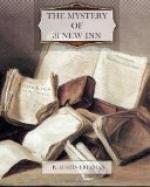“Your uncle could read the cuneiform character, then?”
“Yes; he was something of an expert. These tablets are, I believe, leases and other legal documents from Eridu and other Babylonian cities. He used to copy the inscriptions in the cuneiform writing and then translate them into English. But I mustn’t stay here any longer as I have an engagement for this evening. I just dropped in to get these two volumes—Thornton’s History of Babylonia, which he once advised me to read. Shall I give you the key? You’d better have it and leave it with the porter as you go out.”
He shook hands with us and we walked out with him to the landing and stood watching him as he ran down the stairs. Glancing at Thorndyke by the light of the gas lamp on the landing, I thought I detected in his impassive face that almost imperceptible change of expression to which I have already alluded as indicating pleasure or satisfaction.
“You are looking quite pleased with yourself,” I remarked.
“I am not displeased,” he replied calmly. “Autolycus has picked up a few crumbs; very small ones, but still crumbs. No doubt his learned junior has picked up a few likewise?”
I shook my head—and inwardly suspected it of being rather a thick head.
“I did not perceive anything in the least degree significant in what Stephen was telling you,” said I. “It was all very interesting, but it did not seem to have any bearing on his uncle’s will.”
“I was not referring only to what Stephen has told us, although that was, as you say, very interesting. While he was talking I was looking about the room, and I have seen a very strange thing. Let me show it to you.”
He linked his arm in mine and, walking me back into the room, halted opposite the fire-place.
“There,” said he, “look at that. It is a most remarkable object.”
[Illustration: THE INVERTED INSCRIPTION.]
I followed the direction of his gaze and saw an oblong frame enclosing a large photograph of an inscription in the weird and cabalistic arrow-head character. I looked at it in silence for some seconds and then, somewhat disappointed, remarked:
“I don’t see anything very remarkable in it, under the circumstances. In any ordinary room it would be, I admit; but Stephen has just told us that his uncle was something of an expert in cuneiform writing.”
“Exactly,” said Thorndyke. “That is my point. That is what makes it so remarkable.”
“I don’t follow you at all,” said I. “That a man should hang upon his wall an inscription that is legible to him does not seem to me at all out of the way. It would be much more singular if he should hang up an inscription that he could not read.”
“No doubt,” replied Thorndyke. “But you will agree with me that it would be still more singular if a man should hang upon his wall an inscription that he could read—and hang it upside down.”




